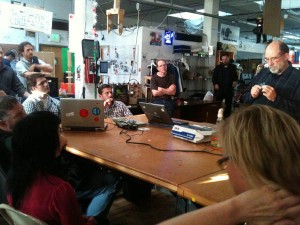Professor Friedman Appraises Another Nuclear Accident
Posted on October 3, 2011
Filed Under Communication, Technology | Leave a Comment
Sharon Friedman, professor of journalism and a communication stalwart at Pennsylvania’s Lehigh University, has now analyzed the news coverage of the world’s three major nuclear power accidents – Three Mile Island in 1979, Chernobyl in 1986 and Fukishima this year. The coverage of TMI, she notes (dispassionate professor that she is), “was called abysmal”. It improved somewhat for Chernobyl and, with the Internet a major factor this last time, “was much more extensive and much better in many cases because of the emphasis on explanations and background information and the visual and graphics capabilities of a number of media organizations.”
Yet, in a current, magisterial article in the Bulletin of the Atomic Scientists, Professor Friedman remains dismayed over the overall quality of nuclear coverage, especially on CNN (which has the most time to devote to it), and troubled by the fading presence of newspaper reporters on the “nuclear beat” (which was never large to begin with).
Read more
Comments
Nuclear Plant Vendors Adopt a ‘Code’ of Their Own
Posted on September 22, 2011
Filed Under Business, Technology | Leave a Comment
The producers (vendors) of the world’s nuclear power plants have adopted a set of “Principles of Conduct” that’s really a code of conduct, but “code” doesn’t translate appropriately in all the world’s languages. The most salient aspects of the Principles are that the drafting process started in 2008, well before this year’s earthquake-triggered disaster at Japan’s Fukushima nuclear plant, and that they are appropriate and welcome.
 It’s not that the nuclear power industry lacks regulations, procedures and earnestly adopted resolves. But it’s a complex industry with many participants. Anything that brings them all together around their own versions of, not simply high-minded, but also practical, commitments on behalf of safety deserves applause.
It’s not that the nuclear power industry lacks regulations, procedures and earnestly adopted resolves. But it’s a complex industry with many participants. Anything that brings them all together around their own versions of, not simply high-minded, but also practical, commitments on behalf of safety deserves applause.
Read more
Comments
Technical Writers As Pencil-Pushing Listeners
Posted on September 13, 2011
Filed Under Technology, The Writing Life | Leave a Comment
It’s great when a technical writer can produce a pristine new procedure from his or her first-time observation of a new piece of equipment and capture what it takes to operate it safely. But it doesn’t always work that way, especially in settings where large numbers of veteran workers are retiring.
The “vets” have a great deal of stored knowledge from their many rounds at the plant, and they’ll be taking it all with them unless technical writers serving as reporters can capture it before they leave. (“Valve 1AS-65 is a pain. When you open it, never open it all the way, because the valve stem leaks.”)
Read more
Comments
We’re Not Social Media ‘Chips’
Posted on September 11, 2011
Filed Under Technology | Leave a Comment
Here from Ivan Walsh is an interesting effort to equate the use of social media by humans with a computer’s operating system. It notes that an operating system includes “software that supports a computer’s basic functions, such as scheduling tasks, executing applications, and controlling peripherals” and includes “multiuser, multiprocessing, multitasking, multithreading and real-time operating systems.”
The big difference, though, is that an operating system is largely automatic. Learning social media takes time and is largely happenstance – it’s a far more random process than a computer chip allows – at least I’ve found it so.
Read more
Comments
Writing Engaging Employee Handbooks
Posted on September 1, 2011
Filed Under Business, Technology, The Writing Life | Leave a Comment
Ever been asked to write an employee handbook? That’s a special challenge because you’re writing on behalf of an organization for the people whose enthusiasm, support and creativity are vital to its success. They don’t cotton to legalese or strictures. An effective handbook needs to be more than simply a recitation of rules. We’re talking, in effect, about technical writing with a human face.
 In this context, we’ve come across a website – klariti.com – with a page on “How to Make Employee Handbooks More Human.” It’s selling an employee handbook template, but it’s modestly priced ($9.99) and might be good to have on hand. Beyond that, though, Ivan Walsh, the writer, has some pertinent tips for putting an engaging handbook together.
In this context, we’ve come across a website – klariti.com – with a page on “How to Make Employee Handbooks More Human.” It’s selling an employee handbook template, but it’s modestly priced ($9.99) and might be good to have on hand. Beyond that, though, Ivan Walsh, the writer, has some pertinent tips for putting an engaging handbook together.
Read more
Comments
‘Crowdsourcing’ – the New, Bigger Water Cooler
Posted on August 28, 2011
Filed Under Technology, The Writing Life | Leave a Comment
Infographics take specialized skill to design and execute, but when they’re done well, are they helpful! Here’s an example from The Content Wrangler site: an infographic on crowdsourcing.
Read more
Comments
Hanging Out With Our Futures
Posted on August 22, 2011
Filed Under Technology | Leave a Comment
Our colleague Dennis Owen is on the road a lot these days and that’s especially why it would be interesting to get his thoughts on this piece by David Lang from the Make magazine blog, “Surrounding Yourself with the Right People.”
 The piece takes off from a quote, “You are the average of the five people you spend the most time with.” So, it follows, be careful who you spend your time with. That makes a lot of sense in terms of whom to avoid. But is it worth being careful about who you associate with in terms of hoped-for creativity? Probably, but that’s more difficult to demonstrate, at least in the short run.
The piece takes off from a quote, “You are the average of the five people you spend the most time with.” So, it follows, be careful who you spend your time with. That makes a lot of sense in terms of whom to avoid. But is it worth being careful about who you associate with in terms of hoped-for creativity? Probably, but that’s more difficult to demonstrate, at least in the short run.
Lang reflects on his work in sailing big chartered sailboats in San Francisco Bay – a skill he’d picked up in a year and a half.
Read more
Comments
Ways To Get The Sleep We Need
Posted on August 15, 2011
Filed Under Uncategorized | Leave a Comment
Here’s something all of us have an opinion on: sleep. Sleep is a good, necessary thing, but how much of a good thing is enough?
Ivan Walsh on the klariti.com blog for small business people has some cogent things to say about sleep. Indeed, they’re worth staying up for.
Read more
Comments
Technical Writers Who Speak, Too
Posted on July 30, 2011
Filed Under Technology, The Writing Life | Leave a Comment
Technical writers may be able to get more mileage, and income, from their knowledge if they can speak it, as well as write it. The notion of speaking about technology to an audience may make some writers queasy, but Sarah Maddox found that it can go surprisingly well.
Sara is a technical writer in Australia who does “ffeathers – a technical writer’s blog.” “You could have blown me down with a feather duster if you’d told me that I would speak at a conference,” she writes. “Then I met Joe Welinske and started blabbing about my love of documentation wikis. There was probably a lot of arm waving and even a bit of in-place leaping about. Joe quickly suggested that I speak at the next WritersUA conference. I remember silence. I probably went pale. But I must have said yes, because within a few months I found myself on stage.
“To my absolute astonishment,” Sarah continues, “my presentation went reasonably well. Since then I’ve presented sessions at a few conferences, and I enjoy the experience more each time.”
Read more
Comments
Banned Chemicals Being Released From Melting Arctic Ice
Posted on July 24, 2011
Filed Under Government, Technology | Leave a Comment
Folly, sadly, gets to be repeated in nature as in life. That’s how a report in the journal Nature Climate Change struck us just now.
So be extra careful.
What we’re talking about is that pollutants known as “persistent organic pollutants,” or POPs, that were outlawed in 2001 apparently are being released in the melting of Arctic ice due to climate change.
 A study released in the journal looked at atmospheric concentrations of three banned chemicals – DDT, HCH and cis-chlordane – between 1993 and 2009 at a station in Norway’s Svalbard Islands and another in the Canadian Arctic.
A study released in the journal looked at atmospheric concentrations of three banned chemicals – DDT, HCH and cis-chlordane – between 1993 and 2009 at a station in Norway’s Svalbard Islands and another in the Canadian Arctic.
The study found, reports Physorg.com, “a slight rise in secondary emissions, from POPs that had been locked in Arctic ice and snow but were now being gradually released because of warming.”
Read more
Comments
Recently
- Presentations With Forethought
- Technical Writing’s Lineage – Surely It’s Deeper than Digital
- At the Holidays, Twitting Amazon
- Successful Cookie Baking – From Mom, an Acknowledged Expert
- Slides for a Tech Writer’s Craft
- Digital or Not, Be Clear
- Being Watchful About Digital Designs…
- When Proposals Don’t Click, Keep Making Them Anyway
- Like a Good Gardener, Help an Enterprise Keep Itself Current
- We’re Leaders All, And Need to Think That Way
Categories
Archives
- January 2017
- December 2016
- November 2016
- October 2016
- September 2016
- August 2016
- July 2016
- June 2016
- May 2016
- April 2016
- March 2016
- February 2016
- January 2016
- December 2015
- November 2015
- October 2015
- September 2015
- August 2015
- July 2015
- June 2015
- May 2015
- April 2015
- March 2015
- February 2015
- January 2015
- December 2014
- November 2014
- October 2014
- March 2014
- February 2014
- January 2014
- December 2013
- November 2013
- October 2013
- September 2013
- August 2013
- July 2013
- June 2013
- May 2013
- April 2013
- March 2013
- February 2013
- January 2013
- December 2012
- November 2012
- October 2012
- September 2012
- August 2012
- July 2012
- June 2012
- May 2012
- April 2012
- March 2012
- February 2012
- January 2012
- December 2011
- November 2011
- October 2011
- September 2011
- August 2011
- July 2011
- June 2011
- May 2011
- April 2011
- March 2011
- February 2011
- January 2011
- December 2010
- November 2010
- October 2010
- September 2010
- August 2010
- July 2010
- June 2010
- May 2010
- April 2010
- March 2010
- February 2010
- January 2010
Blogroll